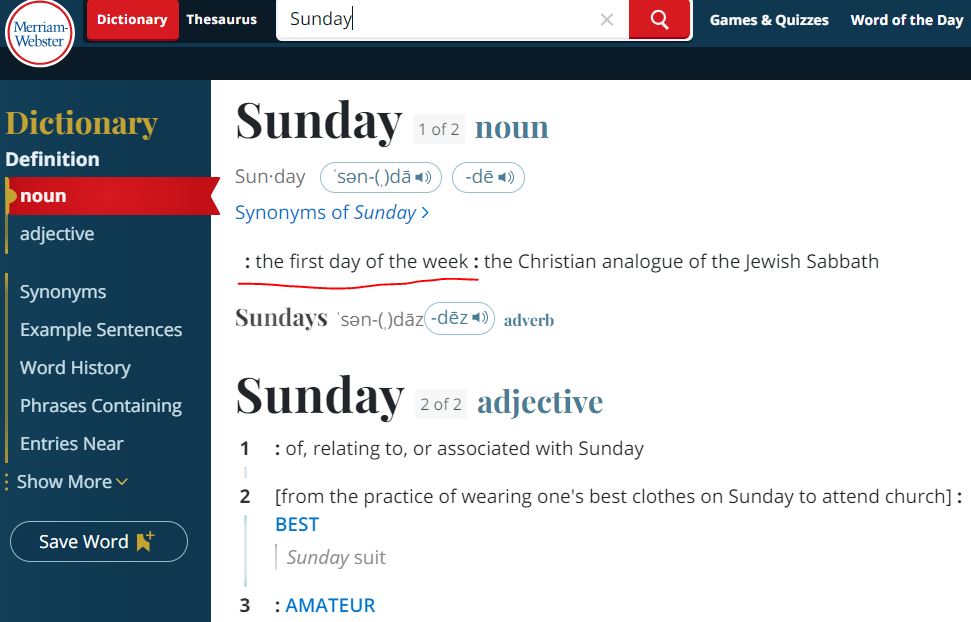Is Sunday the seventh day of the week? If true, what evidence there is to confirm this statement?
Is that important to know exactly which is the seventh day of the week?
The Bible states that God blessed the seventh day and sanctified it! Not only that but commanded to all mankind to rest on that day and do no work in it! (Exodus 20:8-11).
Let’s examine together the evidence of which is the seventh day of the week. This issue may be more important than we realize!
Key Takeaways
- According to the international standard ISO 8601, Sunday is considered the seventh day of the week, but many countries, including the US, Canada, and Japan, consider Sunday as the first day.
- Various theories exist for the origin of the week. One hypothesis suggests that the order of the days of the week was based on Babylonian star deities, while another theory suggests a possible pre-Babylonian origin influenced by Jewish religious beliefs.
- In polytheistic cultures, each day represented a mixture of sacred and profane, but the worship of the Sun god led to the first day of the week being treated with special consideration.
- The Jewish people treated the seventh day of the week, the Sabbath, as sacred. In early Christianity, there was a transition from observing the Sabbath to adopting Sunday as a day of worship, influenced by anti-Jewish tendencies and the prominence of Solar cults.
The International Standard: ISO 8601
If you’re following the International Standard ISO 8601, Sunday is considered the seventh day of the week. This standard was established by the International Organization for Standardization to provide a uniform way of representing dates and times. It is widely used in various fields, including international business, government documents, and computer systems.
Under ISO 8601, weeks start on Monday and end on Sunday. This means that Sunday is designated as the last day of the week rather than the first. This differs from some cultural and religious traditions where Sunday is regarded as the first day of the week.
By adhering to ISO 8601, it allows for consistency and ease of communication across different countries and industries. It ensures that everyone understands which day corresponds to a specific numerical representation or date format.
The Contradiction in Countries
You may be surprised to learn that many countries, including the US, Canada, and Japan, consider Sunday as the first day of the week instead of the seventh.
This contradiction in how different countries view the days of the week can be attributed to cultural and historical factors.
Here are some key points to consider:
- Cultural Influence: The Western world has largely adopted a calendar system based on Christian traditions, where Sunday is seen as a holy day and therefore given significance as the first day of the week. In contrast, other cultures may have different religious or societal practices that influence their perception of the day.
- Historical Origins: The origin of the seven-day week is still debated among scholars, with theories ranging from celestial observations to religious beliefs. Different civilizations throughout history had various ways of organizing time, which impacted their designation of weekdays.
It’s important to understand these cultural and historical contexts when discussing whether Sunday is truly considered the seventh day of the week.
The Webster Dictionary Definition

The Babylonian Hypothesis
The hypothesis suggests that the Babylonians adopted a planetary model to explain the order of the days in their seven-day week. According to this hypothesis, each day of the week was associated with a specific celestial body or deity.
The first hour of each day, corresponding to sunrise, was dedicated to a particular god, and that god’s associated celestial body determined the order of the days.
For example, Sunday was associated with the Sun, Monday with the Moon, Tuesday with Mars, Wednesday with Mercury, Thursday with Jupiter, Friday with Venus, and Saturday with Saturn.
This planetary model provided a logical explanation for the organization of the week and why certain days were given special significance.
The Jewish Connection
The Jewish people ordered the days of the week numerically, with the seventh day being dedicated to rest. This practice originated from their religious beliefs and is deeply rooted in the Scriptures. Here are some key points about the Jewish connection to the ordering of days:
Numerical Ordering:
- The Jewish people did not give names to the weekdays but instead numbered them.
- The first day of the week for them was not Monday but rather the day after Sabbath, which is Sunday.
- They considered Saturday a sacred day and designated it as a day of rest.
Religious Significance:
- The concept of the Sabbath is central in Judaism.
- It symbolizes God’s resting on the seventh day after creating the world.
- Observing Sabbath involves refraining from work, spending time with family, and engaging in spiritual activities.
Understanding this Jewish perspective provides valuable insights into how different cultures have interpreted and organized time throughout history.
Polytheistic Cultures and the Sun God

In polytheistic cultures, the worship of the Sun god played a significant role in determining the special day that would later become known as the first day of the week.
The Sun was considered a powerful deity, representing light, warmth, and life. People believed that by honoring and worshiping the Sun god on this day, they could ensure blessings and prosperity.
This practice originated in ancient Mesopotamia and classical Greco-Roman culture, where Sunday was dedicated to the Sun god. Over time, this tradition spread to other cultures and religions.
While it is important to note that different cultures may have their interpretations and variations, the association between Sunday and the worship of the Sun god remains a common thread throughout history.
The Transition to Sunday as the Christian Sabbath
To understand the transition to Sunday as the Christian Sabbath, imagine yourself living in a time when the seventh day held significant religious importance. Here is an impartial and well-researched explanation of how Sunday became the new Christian Sabbath:
- In early Christianity, both Jewish and pagan Christians observed the seventh-day Sabbath.
- Over time, there was a tendency to abandon the seventh-day Sabbath and adopt Sunday as a day of worship.
- This transition happened gradually and was influenced by anti-Jewish sentiments and the rise of Solar cults.
- Councils and synods played a role in promoting Sunday as a day of rest in remembrance of Jesus’ resurrection.
- By the end of the sixth century, Saturday was largely abandoned as a day of worship, and Sunday took over.
This historical process demonstrates that while Sunday is now considered the first day of the week, it replaced Saturday as the Christian Sabbath.
Also see “Who Changed the Sabbath Day to Sunday?”
Conclusion
Perhaps the best evidence that Sunday is not the seventh day of the week but the first day can be found in the Holy Scriptures.
Luke 23:53 And he took it down, and wrapped it in linen, and laid it in a sepulchre that was hewn in stone, wherein never man before was laid.
Luke 23:54 And that day was the preparation, and the sabbath drew on.
Luke 23:55 And the women also, which came with him from Galilee, followed after, and beheld the sepulchre, and how his body was laid.
Luke 23:56 And they returned, and prepared spices and ointments; and rested the sabbath day according to the commandment.
Luke 24:1 Now upon the first day of the week, very early in the morning, they came unto the sepulchre, bringing the spices which they had prepared, and certain others with them.
Luke 24:2 And they found the stone rolled away from the sepulchre.
Luke 24:3 And they entered in, and found not the body of the Lord Jesus.
Mark 16:9 Now when Jesus was risen early the first day of the week, he appeared first to Mary Magdalene, out of whom he had cast seven devils.
Holy Bible KJV
The Bible states that the Sabbath is on the seventh day of the week, known today as Saturday. (Exodus 20:8-11)
It is well agreed by Churches today that Jesus rose from the grave on the first day of the week. So, if the Sabbath, Saturday is the seventh day of the week, and Jesus rose on the first day, then Sunday is the first day of the week and not the seventh.
References
https://st.network/religion/sunday-is-the-seventh-day-of-the-week-true-or-false.html
https://www.merriam-webster.com/dictionary/Sunday
My Letter To A Sunday Keeper – Sabbath Documentary

The Days of Noah – Powerful Documentary (Video Format)

Bible Studies – Written Format







